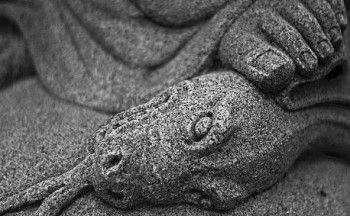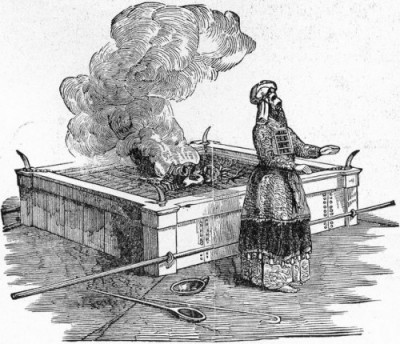What is the gospel of jesus Christ?
The Gospel of Jesus Christ describes His life, death, resurrection, and providence of salvation.
Fact #2: God has always had a plan to deal with Man’s sin
God provided the remedy for the problem of sin.

The appearance of Satan (the tempter) coming in the form of a serpent into the garden of Eden is responded to by the Lord God with a prophetic statement which points to God’s future remedy for sin. Genesis 3:15 states “ And I will put enmity ( antagonism) between you ( the serpent) and the woman and between your seed( those pursuing evil) and her Seed (the coming redeemer) and He (the redeemer) will crush your head (the serpent – Satan) and you (the serpent – Satan) shall bruise His (the redeemer’s) heel”.
New Testament scholars see this passage as a prophetic promise referring to Jesus Christ our Redeemer and His future accomplishment on the cross. Christ is the Seed of the woman- (see Matthew 1 and Luke 2 – the virgin birth). His suffering and death on the cross pointed to Satan’s “bruising His heel” (causing Christ to suffer) while “He will bruise your head”( He destroys the serpent’s power and schemes through the cross and resurrection).
A second example of God’s substitutionary provision for sin in the Genesis account is found in the clothing that God provided for Adam and Eve in their nakedness. Genesis 3:21 –“ And the Lord God made for Adam and his wife garments of skins and clothed them”.
God, having known of man’s fall into sin provided a substitution by immediately providing a sacrifice. The clothing that the Lord provided required the sacrifice of another – the life of an animal was taken. This action set the precedence for establishing the Old Testament system of temple sacrifice for the covering of sin for the nation of Israel – God’s people. This system pointed toward and found it’s fulfillment in the cross of Jesus Christ where He provided the complete cleansing for all of man’s sins – past, present and future by His sacrificial death on the cross.

We are individually accountable to God.
When Adam and Eve disobeyed God’s express will and chose their way rather than God’s way, they could not point the finger of blame at anyone but themselves. They were sent from the garden of Eden never to return and the consequences of their choice rested with them alone. They were each individually accountable to God. Although the Genesis account does not provide us with many details, it would appear that Adam and Eve lived out their days with a clear understanding of God’s ultimate Lordship over His creation. However, the results of sin and the choice for evil continued within their family – (murder and separation – Genesis 4:1-15).
The choice to sin and to pursue evil did not stop with Adam and Eve and their immediate family but as the record of the Scriptures indicates, the generations of men that followed naturally chose their own way rather than God’s way. The remaining text of the Old Testament Scriptures provides us with a great deal of information on the fact of man’s sinful nature, his accountability to God for sin and the willingness of God to forgive and cleanse sin.
The following Scriptures provide us with a description of God’s heart of mercy and love for mankind.
Ezekiel 18:30-31 – “Therefore I will judge you nation of Israel everyone according to his ways says the Lord God. Repent and turn from all of your transgressions so that iniquity will not be your ruin. Cast away from you all the transgressions which you have committed and get yourselves a new heart and a new spirit.”
Psalm 51:1-4 – “Have mercy on me O God according to Your lovingkindness, according to the multitude of Your tender mercies, blot out my transgressions. Wash me thoroughly from my iniquity and cleanse me from my sin. For I acknowledge my transgressions and my sin is always before me. Against You, You only have I sinned and done this evil in Your sight” . Verse 7,9 – “Purge me with hyssop and I will be clean; wash me and I will be whiter than snow. Hide Your face from my sins and blot out all my iniquities”.
Psalm 32:1 – “Blessed is he whose transgression is forgiven, whose sin is covered”.
Isaiah 43:25 – The Lord says – “I, even I am He who blots out your transgressions for My own sake; and I will not remember your sins”.
Micah 7:18,19 – “Who is a God like You? Pardoning iniquity and passing over the transgression of the remnant of His heritage? He (the Lord) does not retain His anger forever, because He delights in mercy. He will again have compassion on us and will subdue our iniquities. You (the Lord) will cast all our sins into the depths of the sea”.
This is the heart of God – to forgive , to cleanse and to restore and these Scripture passages along with many others affirm the truth that the God Who created us desires to restore us to Himself- to a place of relationship and community.
What was the basis in the Old Testament for dealing with sin and the restoration of this right relationship with God?
God is interested in our hearts and He desires for us to know Him. It is not some type of an external show or religious demonstration that God is looking for but rather He wants our heart, our mind, our emotions and our will. In the Old Testament Scriptures this inward response to God was accompanied by an external act of worship and an altar of sacrifice. The principle of a sacrifice offered to God as an act of worship and reverence started from the very first human family and continued throughout the entire history of the Old Testament. At least (17) separate individuals are recorded in the Scriptures offering sacrifices of worship to the Lord.
Adam and Eve , Cain and Abel – Genesis 4:1-15, Noah – Genesis 8:20-22, Abraham – Genesis 12:7,8 , 13:4,18, 22:1-14, Isaac – Genesis 26:25, Jacob – Genesis 31:51-53, 33:17-20, 35:1-7,13-15, 46:1-4, Moses – Exodus 17:15.
This sacrificial worship was later firmly established in the nation of Israel – (God’s missionary nation) in the Levitical system of national worship and cleansing of sin. The book of Leviticus is a record of God’s instructions to the nation of Israel on how they were to deal with their sin and enter into a right national and personal relationship with Him. There were various offerings and sacrifices that they were instructed to observe.
These offerings were in the form of the death and sacrifice of an animal – sheep, goat, bull ,ram, specific bird or the offering of a grain harvest

1. The Burnt Offering – denoted total surrender to God.
2. The Grain Offering – thanksgiving and devotion to God.
3. The Peace Offering – thanksgiving and reflecting the desire for a right relationship (peace) with God.
4. Sin Offering – offered for sins.
5. Trespass Offering – offered for sins against the Lord.
These sacrifices were offered to the Lord not simply as an outward religious duty but they were to reflect the inward condition of the heart. Although God commanded the altar of sacrifice, He was looking beyond this to the inward heart of sacrifice, surrender and submission of those who were offering the sacrifices- Amos 5:21,22 , Jeremiah 6:20.
Psalm 51:6,16,17 – “Behold You (Lord) desire truth in the inward parts and in the hidden part You will make me to know wisdom …. For You do not desire sacrifice or else I would give it, You do not delight in burnt offering. The sacrifices of God are a broken spirit, a broken and contrite heart. These O God You will not despise”.
I Samuel 15:22 – “Has the Lord as great delight in burnt offerings and sacrifices, as in obeying the voice of the Lord? Behold to obey is better than sacrifice and to heed (the Lord) than the fat of rams”.
One very important principle in this sacrifice of obedience and worship was the importance of the blood of the sacrifice animal. In the book of Leviticus there were very specific instructions as to when, where and how the various sacrifices were to be performed. But the basis of these sacrifices was that blood would have to be shed for sin and the value of the life was the measure of the value of the blood of the sacrifice.
The Day of Atonement (one day each year) Leviticus 16:29-30, 23:27-28 was the most important day in the life of the nation of Israel. God commanded Israel to set aside this one day (the 10th day of the 7th month) and on this day the people were to bring a sin offering, an innocent animal sacrifice. The life of this animal was to be taken and it’s blood was to be used to make atonement for the sins of the people. On this day the high priest would go into the holy place with the blood of the sacrifice and he would sprinkle it seven times before the mercy seat and on this basis the sins of the people were atoned for.
Leviticus 16:30 – “ For on that day (day of atonement) the priest will make atonement for you, to cleanse you, that you may be clean from all your sins before the Lord”. Verse 34 – “ This shall be an everlasting statue for you, to make atonement for the sins of the nation of Israel, for all their sins, once a year”. Leviticus 17:11 – “ For the life of the flesh is in the blood and I have given it to you on the altar to make atonement for your souls; for it is the blood that makes atonement for the soul”. Hebrews 9:22 – “ And according to the law almost all things are purified with blood and without the shedding of blood there is no remission (of sin)”.